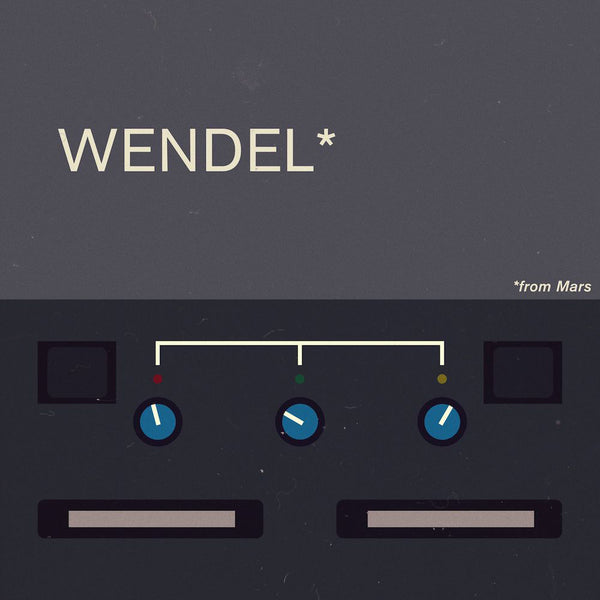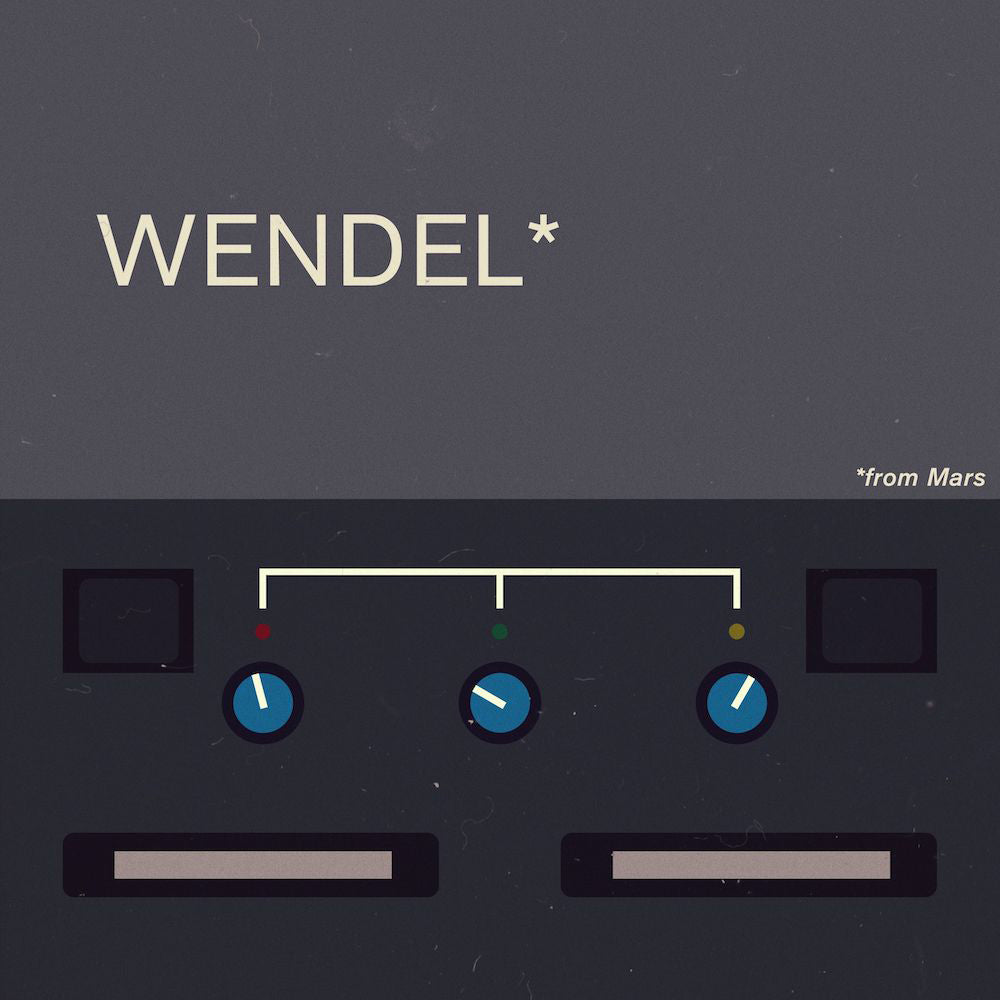WENDEL FROM MARS
$29.00 $14.50
The Vintage Drum Replacer, Transformed into a Drum Machine Pack
Making its debut in 1984, the Wendel Jr. was a lighting-fast drum replacer featuring acoustic drum and percussion samples engineered by Roger Nichols. Based on its $80,000 predecessor (simply known as the Wendel), the Jr. featured the same sounds - most famously used (and created specifically) for bringing Steely Dan’s Gaucho drum sounds to life during failed studio sessions. Ultimately the Wendel itself was awarded a platinum record for "his" contribution, and the Jr. featured on numerous hits, from country to rock and disco.
The Wendel emphatically stated it was not a drum machine, and instead intended to replace drum machines' "horrible" sounds. But since we love drum machines, we decided to turn it into one, sourcing 20 of the original cartridges and creating the most extensive multi-sample Wendel pack in existence.

The Sounds
The Wendel claims to have some of the best drums and percussion ever recorded. That is likely an overstatement. But it is packed with interesting, useable, and downright quirky acoustic hits. We've got the classic "Heart" kick and snare, plus 2 more snares, a snare echo, rimshot, hi hats, cowbells, toms, duck quacks, explosions, and more. Above all else, the Wendel is unique and FUN:
The Sampling Process
The Wendel was known for being clean - boasting hi fidelity, digital samples with no EQ - unlike most drum machines of the time, whose sounds were often recorded to tape first. So naturally, we followed suit, preserving the original transients and punch by recording directly into our Apogee Symphony MKII converter. The original samples were recorded at 50 kHz, so we set our sample rate to 96k.

The front panel tuning control on the Wendel offers a 2 octave range, so we sampled 24 pitches for each voice, doing the best we could with these tiny tuners! Each sample was then carefully trimmed to maintain the machine’s inherent timing, with the Wendel triggered via audio pulse from an ERM multi clock.
Getting Colorful
The clean samples are a chance for us to preserve the integrity of what we sample, without injecting our own philosophies. Conversely, the color samples are an opportunity to do whatever we want! And since Mr. Nichols was so adamant about not using tape or EQ, we immediately reached for our EQs and tape machine:
The goal of the processing was to get the Wendel on tape, add flavor, hype the transient, raise the sustain, and capture varying degrees of aggression. We wanted a fast, solid state sound, and only used tubes on the Toms.

While each voice was treated somewhat differently, the basic process was:
EQ -> Saturation -> Compression / Transient Design -> Tape (15 IPS) -> Gate / Filter -> EQ.
The first EQ prepared the sound for the saturator (namely, removing bass or boosting mid-range, so it saturates more pleasantly). The saturator raises the sustain, but at the expense of punch, so we compressed after the saturation, often in parallel. The compression exaggerates the attack (that will be reduced by the tape machine).
After the tape machine, we used our SSL gate on everything, further shaping the attack and release. The filter was used after the tape machine on the Kick, to have a darker sustain that wasn't covered in tape hiss. The final EQ was used to add more bass after the tape machine (another extremely important trick). You can read more about all of the gear we used here.
What You Get
Ultimately we captured 20 unique drum voices with 24 pitches each. For each drum sound you'll get 1-3 processed versions of every pitch. In total this amounts to 1536 samples, which have been broken down into 7x 16 hit kits for easier use, and mapped to various DAWs and samplers. In Ableton, a master drum rack has macros for changing the Wendel's tuning.

The Takeaway
So, are the sounds some of the best recordings of acoustic drums and percussion ever, as Mr. Nichols claims? Probably not. but they are extremely well recorded, vintage acoustic drums and percussion sounds with loads of flavor and fun for all types of genres.
With its explosions, duck quacks, echos, and unbeatable snares, the Wendel offers a unique take on rare 80s drum sounds that just aren't being used on many records anymore.
Contents:
- (1536) 24bit WAV Samples
- Clean and processed versions for all hits
- (7) 16x Hit Kits for easy jamming
- (24) Multi-sampled pitches for Kick, 4 Snares, 4 Cowbells, Echo, Cross Stick, Block, Hi Hats, Ducks (Guiros), Tom, Explosion, and Handclaps.
- All samples from the original Wendel Jr. cartridges
- 100% Hardware processing
- 166.7 MB Unzipped
- About
Formatting:
- Ableton includes (1) master drum rack containing all samples, and (7) additional pre-made kits racks.
- Kontakt, Logic EXS, Reason NNXT, and SFZ include: (64) Individual Hits Instruments and (7) Kits Instruments
- Maschine, Battery, FL Studio and Reason Kong include: (7) pre-made kits.
- MPC1000 and MPC2500 include: (7) pre-made kits on 2 programs
- MPC Live and MPC X include: (7) pre-made kits on 2 programs7 MB Unzipped (44.1k)Requirements
Requirements
- Any 24 bit WAV Compatible DAW or Sampler
- Ableton Live 9.7+ (Not Intro)
- Kontakt 5.6.5+ (Not Kontakt Player)
- Logic 9+
- Maschine 2.6+
- Reason 8+
- Battery 4.1.5+
- MPC1000, MPC2500, MPC Live, MPC X
- 166.7 MB Free Space
Contents:
- (1536) 24bit WAV Samples
- Clean and processed versions for all hits
- (7) 16x Hit Kits for easy jamming
- (24) Multi-sampled pitches for Kick, 4 Snares, 4 Cowbells, Echo, Cross Stick, Block, Hi Hats, Ducks (Guiros), Tom, Explosion, and Handclaps.
- All samples from the original Wendel Jr. cartridges
- 100% Hardware processing
- 166.7 MB Unzipped
- About
Formatting:
- Ableton includes (1) master drum rack containing all samples, and (7) additional pre-made kits racks.
- Kontakt, Logic EXS, Reason NNXT, and SFZ include: (64) Individual Hits Instruments and (7) Kits Instruments
- Maschine, Battery, FL Studio and Reason Kong include: (7) pre-made kits.
- MPC1000 and MPC2500 include: (7) pre-made kits on 2 programs
- MPC Live and MPC X include: (7) pre-made kits on 2 programs7 MB Unzipped (44.1k)Requirements
Requirements
- Any 24 bit WAV Compatible DAW or Sampler
- Ableton Live 9.7+ (Not Intro)
- Kontakt 5.6.5+ (Not Kontakt Player)
- Logic 9+
- Maschine 2.6+
- Reason 8+
- Battery 4.1.5+
- MPC1000, MPC2500, MPC Live, MPC X
- 166.7 MB Free Space










